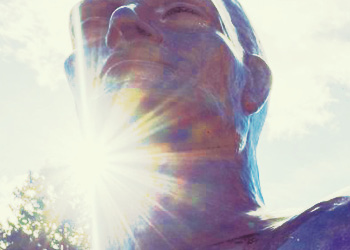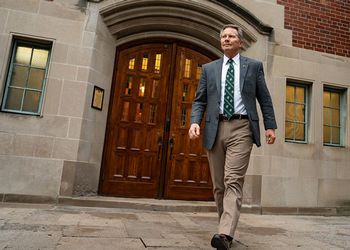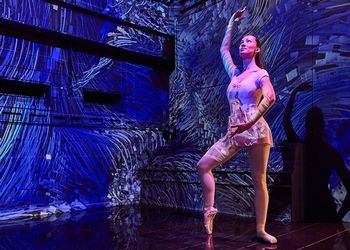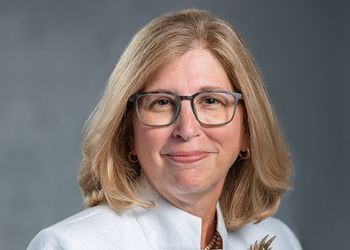Feature: Teens Try on the White Coat

Teens Try on the White Coat
MSU program gives high school students an up-close and personal look at potential medical careers
How do you roust a bunch of teenagers out of bed on a Saturday morning? Well, start them off with a free breakfast. Add a chance to see surgeons working. Sprinkle in some forensic science. And close with the opportunity to diagnose injuries on teaching X-rays.
At least that’s how the Future DOcs program does it. Future DOcs is an outreach initiative created and run by Michigan State University’s College of Osteopathic Medicine (COM) and area hospitals.
The program introduces bright teenagers from underrepresented backgrounds to potential medical professions early in their academic careers. Launched in Detroit in 2012, the program expanded last year to a second location in Macomb County.
This summer, it premiered in Lansing with 16 academically talented students from three local high schools: Eastern, Everett and J.W. Sexton. The group spent seven successive Saturday mornings alternating between the COM classrooms and Sparrow Health System’s Lansing hospital.
Students were selected based on GPAS, recommendations from guidance counselors, personal essays and a willingness to attend every meeting.
In exchange, they heard talks by medical professionals, took behind-the-scenes hospital tours and tried their hand at real-world activities specific to the practice of medicine.
“Future DOcs gives high school students the chance to see doctors, nurses and other health-care workers in action—a value in itself—and it also offers them the chance to build mentoring relationships with our osteopathic medical school students. They spend time in the hospital and in the medical school and have the chance to imagine their futures in these settings. In addition, they also take part in activities to help them build leadership and study skills. There are not a lot of programs out there with so many valuable facets,” said William D. Strampel, D.O., dean of MSU’s COM.
A Look Behind the Scenes
During a recent session, Timothy Hodge, D.O.—executive medical director of Sparrow’s emergency services—welcomed the wide-eyed group in blue scrubs to the Lansing-based 676-bed hospital, the region’s largest.
A graduate of MSU’ COM himself, Hodge,’87, happily played Pied Piper, shepherding students to the doctors-only dining room for breakfast, which was followed by breakout sessions with Sparrow cardiologists and radiologists. The specialists showed students around their respective labs and operating rooms, and ran hands-on activities with some of their departments’ diagnostic tools.
The Future DOcs also rubbed shoulders with some of COM’s med school students who doubled as volunteer program assistants.
A senior at J.W. Sexton High School, Cuban-born Nicholas “Nick” Carbonell said he comes from a family of physicians and nurses. Participating in Future DOcs reinforced his long-held desire to follow in his family’s footsteps.
“I know it will be the best feeling in the world to go to sleep knowing there’s one less sick, disabled or diseased person in the world because of something I did. It would be great knowing I had that kind of impact on society,” he said.
The seriousness of practicing medicine was lightened with touches of whimsy when appropriate. For instance, when it was time for students to try their hand at making X-rays, they discovered their patients were plush animals—who, it turned out, had swallowed everything from trinkets and toys to women’s jewelry.
And friendly rounds of a Jeopardy-inspired game challenged students to Name that Fracture.
Students also got to try a range of real-world medical tasks. One day they were using medical “mannikins” to practice intubating infants and adults. Another day they practiced putting a neck collar on a patient, played by an emergency medical technician. Using blood pressure cuffs, stethoscopes, spine boards and tourniquets were all part of the curriculum.
Open to Questions
Throughout the morning, the aspiring docs peppered the professionals with thoughtful questions. Bria Bush, a senior at J.W. Sexton High School, asked a multitude of questions each week. “I was worried the doctors would get annoyed if I asked too many questions. But nothing could have been further from the truth. Everyone was friendly, very helpful and handed out their e-mail addresses if we had future questions.”
Among the inquiries, the students asked:
An ultrasound technician: “Do you ever get emotional when you find an expectant mother’s fetus isn’t developing properly?” (Yes, you feel sadness.) “How do you tell the patient?” (We call the obstetrician in to make sure we’re making the proper diagnosis. And if so, the physician spends time talking to the patient and discussing details.)
A couple of surgeons: “Do you create music playlists to listen to in the operating room?” (Yes, some do. But everyone in the O.R. should agree on the genre.)
Other attending physicians: “How do you feel if you can’t save a patient?” (Doctors grieve, too.)
Each week, Hodge said he saw more young eyes opening to their future potential and growing self-confidence among the charges.
And the students didn’t shy away from some of the difficult positive topics about medical careers. They sparked frank discussions on the medical school’s admission requirements, costs of attendance, and financial aid availability, and they wanted to know how much study time they should be prepared to spend outside the classroom.
Kieu-Vi Nguyen, a junior at Everett High School, said: “It’s scary knowing this is what I want. It’s a long road and I’ll have to stay focused. But I want to live my life meaningfully. I want to do something that helps people.”
Volunteer second-year COM student Genevieve Davis said she wishes there had been a program like Future DOcs when she was a teenager.
“I think it’s neat that the Future DOcs program is taking the initiative to introduce these students to health care. In high school, I wasn’t informed of all the career possibilities like they are,” Davis said.
Hodge said the program has been such a hit that discussions are under way in Lansing in hopes of expanding it.
“And as a baby boomer,” he said with a smile, “I wouldn’t be surprised if these students end up contributing to my care one day.”
Among the other MSU alumni instrumental to the program is Joyce De Jong, D.O., Ingham County’s medical examiner and medical director of Sparrow hospital’s department of forensic pathology.



